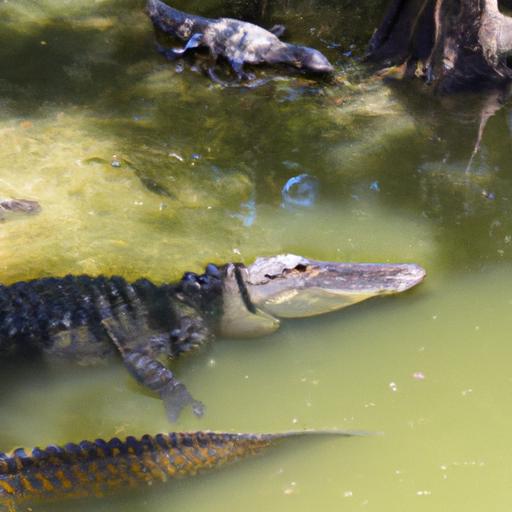
Discover the feeding habits of alligators and iguanas. do alligators eat iguanas? Explore the behavior of these fascinating reptiles and their role in the ecosystem.
When we think of reptiles, alligators and iguanas are certainly among the most captivating creatures. These animals are beloved by both animal enthusiasts and researchers due to their unique characteristics and behaviors. One question that has intrigued the reptile community is whether or not alligators devour iguanas. This query not only provides insights into the feeding habits of these animals, but also sheds light on their behavior in the wild.
Alligator Feeding Habits
Alligators are renowned for their carnivorous diet, consisting of a diverse range of prey such as fish, turtles, birds, and mammals. As apex predators, they have developed specialized hunting techniques utilizing their powerful jaws and sharp teeth.
Explanation of Alligator’s Diet
Alligators are opportunistic feeders, devouring whatever prey is available to them. Their diet is influenced by factors such as their location, habitat, and size. For example, alligators in freshwater habitats typically consume more fish, while those in saltwater habitats prefer crabs and mollusks.
What Alligators Typically Eat
Alligators have a broad palate and can consume anything from small insects to large mammals. Common prey items include fish, turtles, birds, and small mammals like raccoons and possums.
How They Hunt and Catch Their Prey
Alligators employ various hunting techniques to capture their prey. They patiently wait until their prey is within striking distance, using their powerful jaws to seize and secure their meal. Alligators also utilize their tails to stun prey and create water disturbances, disorienting and confusing their targets.
Overall, alligators are skilled hunters that have adapted to their environment in order to survive. Understanding their feeding habits is crucial for comprehending their role in the ecosystem.
Iguana Diet and Habits
Overview of Iguana’s Diet
Iguanas are known for their herbivorous diet, feeding primarily on plants. The specific plants they consume vary based on their habitat and availability. In the wild, iguanas primarily indulge in fruits, flowers, and leaves, while in captivity, they are usually fed a diet consisting of leafy greens, fruits, and vegetables.
It is vital to note that iguanas have specific dietary requirements and need proper nutrition to maintain their health. Feeding them the wrong types of food or insufficient quantities can lead to severe health issues such as metabolic bone disease, obesity, and malnutrition.
Their Feeding Habits
Iguanas are diurnal creatures, meaning they are most active during the day. They spend a significant amount of time basking in the sun to regulate their body temperature and aid in digestion.
Iguanas exhibit a unique feeding behavior, using their tongues to grasp and pull leaves towards their mouths. Their sharp, serrated teeth assist in cutting through tough plant materials.
Where They Can be Found
Iguanas are native to Central and South America, as well as the Caribbean. However, they have been introduced to other parts of the world, including Florida and Hawaii, where they have become invasive species.
In their natural habitat, iguanas inhabit various environments such as forests, grasslands, deserts, and coastal areas. They are even capable of swimming in the ocean and feeding on algae and seaweed.
Alligators and Iguanas in the Wild
Alligators and iguanas are distinct reptiles that dwell in different environments, but their paths can intersect in certain areas. The burning question remains: would alligators devour iguanas if given the opportunity?
The likelihood of an alligator eating an iguana
Alligators are opportunistic predators, consuming any prey they can catch and consume. While iguanas are not a typical part of an alligator’s diet, it is not unheard of for them to dine on iguanas.
The likelihood of an alligator devouring an iguana depends on various factors, such as the size of the iguana and the availability of other prey. If an alligator is hungry and cannot find its usual prey, it may resort to consuming an iguana if the opportunity presents itself.
Factors that may influence the behavior of the alligator
Though alligators are known for their aggressive nature, they are also cautious animals that typically only attack when they feel threatened or hungry. An alligator will most likely avoid an iguana if it senses danger. Additionally, the presence of other predators in the vicinity can influence an alligator’s behavior, making it more wary and less likely to attack an iguana.
How iguanas can protect themselves from alligators
Iguanas possess their own defense mechanisms that protect them from predators, including alligators. With their excellent climbing abilities, iguanas can escape danger by scaling trees or other elevated objects. Additionally, if an iguana feels threatened, it can detach its tail, distracting the predator and providing an opportunity for escape.
In conclusion, while alligators may occasionally consume iguanas, it is not a common occurrence. Both animals exhibit unique behaviors and defense mechanisms that enable them to coexist in the same environment.
Alligator and Iguana Interactions in Captivity
Understanding the behavior of alligators and iguanas in confined settings is crucial for those considering keeping these animals as pets or for educational purposes.
How alligators and iguanas behave in captivity
Alligators and iguanas display different behaviors in captivity compared to their behaviors in the wild. Alligators tend to be less aggressive and more docile when raised in captivity. Conversely, iguanas can become more aggressive and territorial in enclosed environments.
Can alligators and iguanas be housed together?
Despite their seemingly compatible traits, it is not advisable to house alligators and iguanas together. Alligators are carnivorous animals and may perceive iguanas as potential sources of food. In turn, iguanas can become stressed and agitated when housed with larger animals.
What happens when an alligator is fed an iguana in captivity?
Feeding an iguana to an alligator in captivity is not recommended. Not only is it unethical to feed one animal to another, but it can also lead to health issues for both creatures. Alligators are not anatomically designed to consume iguanas, and their digestive systems may struggle to process such food. Additionally, iguanas may suffer from stress and trauma when used as prey for other animals.
In conclusion, it is essential to understand the behavior of alligators and iguanas in captivity before considering them as pets or for educational purposes. While these reptiles may appear intriguing to keep, their well-being should be prioritized, avoiding potential harm or stress.
Conclusion
The question of whether alligators eat iguanas is undeniably captivating, shedding light on the behavior and feeding habits of these two remarkable reptiles. We have delved into the diets and habits of alligators and iguanas, their interactions in the wild and in captivity, and the likelihood of an alligator consuming an iguana.
While it is true that alligators have been known to consume iguanas, it is not a frequent occurrence. Various factors, such as the size of the iguana, its habitat, and the behavior of the alligator, contribute to the likelihood of such an event.
As we continue to study and learn more about these reptiles, it is crucial to acknowledge the roles they play in the ecosystem. Alligators and iguanas possess unique characteristics and behaviors that make them invaluable members of their respective environments.
If you wish to broaden your knowledge and appreciation for these incredible creatures, be sure to check out iguanafacts.com. This reliable source offers a wealth of information on all things iguana, enabling you to deepen your understanding and admiration for these extraordinary animals.




